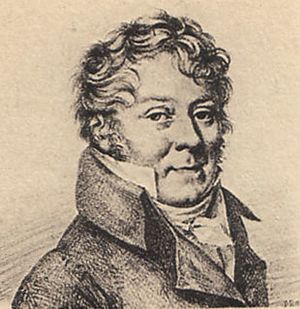Victor-Joseph Étienne de Jouy facts for kids
Victor-Joseph Étienne de Jouy (born October 19, 1764 – died September 4, 1846) was a French writer. He started his career in the army but later became a very successful writer. He wrote plays for operas, which are called librettos, and also other stories.
Contents
About Étienne de Jouy
His Early Life and Military Career
Victor-Joseph Étienne de Jouy was born in Versailles, France, in 1764. When he was 18, he joined the army. He traveled to Guiana in South America. He soon returned to France to finish his studies. Two years later, he rejoined the army and was sent to India. Many of his experiences there later inspired his writings.
When the French Revolution began, he came back to France. He fought bravely in the early battles and became an important officer. However, he got into trouble for not supporting a famous leader named Marat. He had to run away to save his life.
After a very difficult time called "the Terror" ended, he went back to the army. But he was again suspected of working against France. He was accused of talking with an English diplomat. He was found innocent, but he was tired of all the accusations. So, he left the army, saying it was because of his injuries.
At some point, de Jouy married a British woman. Her mother was a novelist named Lady Mary Hamilton.
Becoming a Writer
After leaving the army, de Jouy started focusing on writing. In 1807, he wrote the story for an opera called La vestale. The music was by Gaspare Spontini. This opera was a huge success! It was performed for 100 nights. The Institut de France even called its story the best opera play of that time.
He wrote more opera stories, like Fernand Cortez and Abencérages. But none were as popular as La vestale. From 1811 to 1814, he wrote funny stories about life in Paris. These were published in a newspaper called Gazette de France. Later, these stories were put together in books called L'Ermite de la Chaussée d'Antin. This made him famous as a journalist. He also wrote for other newspapers.
De Jouy also helped start a book called Biographie nouvelle des contemporains. He encouraged a young journalist named François Buloz to write for it. Buloz later became very successful.
In 1821, his play Sylla was a big hit. This was partly because of a great actor named Talma. Talma had studied the main character by watching Napoleon. The play opened on December 27, 1821, at the Théâtre-Français.
During a time called the Restoration, de Jouy always fought for freedom. People at the time really respected him for his beliefs. Victor-Joseph Étienne de Jouy died on September 4, 1846. He passed away in rooms given to him at the Château de St Germain-en-Laye.
Famous Works
Here are some of the most well-known works by Étienne de Jouy. These include opera stories and plays:
- Milton (1804), an opera story with A.-M. Dieulafoy, music by Spontini
- La Vestale (1807), an opera story, music by Spontini
- Fernand Cortez (1809), an opera story with J.-A. Esménard, music by Spontini
- Les amazones, ou La fondation de Thèbes (1811), an opera story, music by Étienne Méhul
- Tippo Saeb (1813), a play
- Les Abencérages, ou L'étendard de Grenade (1813), an opera story, music by Cherubini
- Belisaire (1818), a play
- Les Hermites en prison (1823), written with Antoine Jay when they were both political prisoners
- Moïse et Pharaon (1827), an opera story with Luigi Balocchi, music by Rossini
- Guillaume Tell (1829), an opera story with Hippolyte Bis, music by Rossini.
See also
 In Spanish: Étienne de Jouy para niños
In Spanish: Étienne de Jouy para niños
- Badaud
 | Laphonza Butler |
 | Daisy Bates |
 | Elizabeth Piper Ensley |


